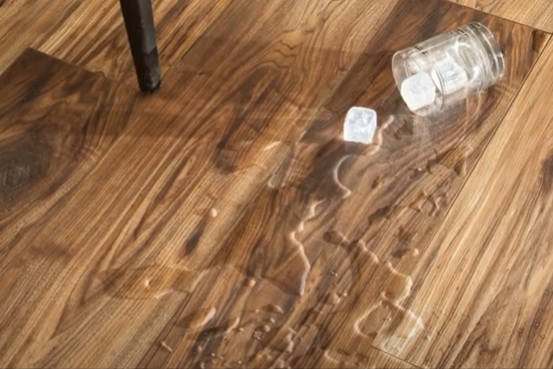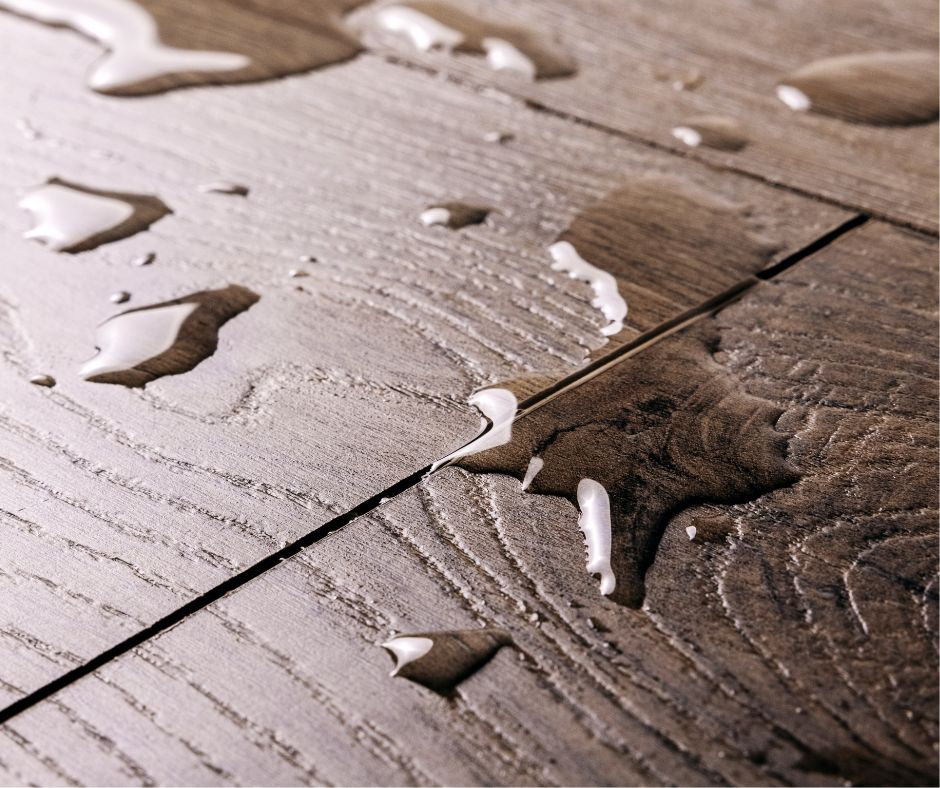Have you ever spilled a glass of red wine on your carpet, your heart sinking as the stain spreads like wildfire? Or maybe you’ve dealt with the water damage caused by a leaky faucet or overflowing washing machine? If so, you know the nightmare that can unfold when your flooring isn’t up to the task of handling water. Flooring is a major investment, and choosing the right type can save you headaches and potential disasters down the line.

Image: longdaflooring.com
That’s where the debate between waterproof and water-resistant vinyl flooring arises. Both offer attractive looks and durability, making them popular choices for homes. But when it comes to protecting your floors from spills and leaks, there’s a crucial distinction. This article will break down the differences between waterproof and water-resistant vinyl flooring, helping you make the best choice for your unique needs.
Understanding Water Resistance
An Impermeable Barrier
Water resistance in vinyl flooring means that the material can withstand limited exposure to water. Think of it as a shield that prevents water from quickly penetrating the floor’s surface. This protection is thanks to a special layer or coating that’s applied to the top of the vinyl. This layer creates a barrier that repels water droplets, preventing them from soaking into the core of the material.
However, water resistance is not a guarantee against all water damage. Water-resistant vinyl is designed to resist spills and splashes, not prolonged submersion. If a large amount of water sits on the floor, it might eventually seep through the protective layer, causing damage to the subfloor.
A Deeper Dive into Waterproof Vinyl

Image: www.normanfloorcovering.com
Totally Enclosed
Waterproof vinyl flooring takes the concept of protection to another level. It’s designed to be completely impervious to water, thanks to its core construction. The core of waterproof vinyl is made from a solid, non-porous material, typically a combination of PVC layers. This solid core prevents water from seeping through, even if it’s exposed to a significant amount of moisture.
Think of waterproof vinyl as a fortress against water damage. It’s the ultimate choice for kitchens, bathrooms, laundry rooms, and any other areas prone to spills, leaks, or even flooding. With waterproof vinyl, you can rest assured that your floors will stay dry and damage-free, even in the event of a major incident.
Key Differences: Waterproof vs. Water-Resistant Vinyl
A Table to Clarify
Here’s a quick comparison to illustrate the key differences between the two types of vinyl flooring:
| Feature | Waterproof Vinyl | Water-Resistant Vinyl |
|---|---|---|
| Core Material | Solid, non-porous (PVC layers) | Porous core with protective layer |
| Water Protection | Completely impervious to water | Resists spills and splashes but not prolonged submersion |
| Suitable for | High-moisture areas (kitchens, bathrooms, laundry rooms) | Low-moisture areas, occasional spills |
| Durability | Generally more durable | Less durable in areas with prolonged exposure to water |
| Cost | Typically more expensive | Usually less expensive |
Trends in Waterproof and Water-Resistant Vinyl Flooring
Staying Ahead of the Curve
The market for vinyl flooring is constantly evolving, with innovations happening all the time. One of the key trends is the development of more realistic-looking waterproof vinyl. Manufacturers are pushing the boundaries with new technologies that allow them to replicate the appearance of wood, stone, and even tile with incredible detail. This advancement in aesthetics makes waterproof vinyl an even more alluring option for homeowners who want beautiful, durable floors.
Another trend is the increasing emphasis on sustainability. Manufacturers are utilizing recycled materials to create their vinyl flooring and incorporating eco-friendly manufacturing processes. This movement towards sustainability is a positive development for the vinyl flooring industry, making it a more environmentally conscious choice for consumers.
Tips for Choosing the Right Vinyl Flooring
Making the Right Call
Choosing between waterproof and water-resistant vinyl flooring depends on your individual needs and preferences. Here are some tips to help you decide:
- Consider the location: If your flooring will be in a high-moisture area like a kitchen, bathroom, or laundry room, waterproof vinyl is the safer bet. For living rooms, bedrooms, and low-usage areas, water-resistant vinyl might be sufficient.
- Think about your lifestyle: Do you frequently spill things or have young children who are prone to accidents? If so, waterproof vinyl might be the better option. If you are relatively careful with spills and don’t expect a lot of moisture exposure, water-resistant vinyl could be a good choice.
- Assess your budget: Waterproof vinyl is typically more expensive than its water-resistant counterpart. Consider your budget constraints and prioritize the most important features for you.
- Read reviews and get professional advice: Research different brands and products, and read reviews from other homeowners. Consulting with a flooring specialist can help you narrow down your options and make an informed decision.
Choosing the Right Type for Your Needs
The choice between waterproof and water-resistant vinyl flooring boils down to your specific needs and how you intend to use your floors. If you want the ultimate protection against water damage and peace of mind, waterproof vinyl is the way to go. If your floors won’t be subjected to constant moisture exposure and your spills tend to be minor, water-resistant vinyl could be a cost-effective solution.
Ultimately, the best decision is the one that aligns with your unique needs and lifestyle. Do your research, consider your options, and make a choice that will ensure the longevity and beauty of your flooring for years to come.
FAQ
Q: What are the pros and cons of waterproof vinyl flooring?
Pros: Completely impervious to water, extremely durable, suitable for high-moisture areas, wide range of styles and designs.
Cons: Typically more expensive than water-resistant vinyl.
Q: What are the pros and cons of water-resistant vinyl flooring?
Pros: More affordable than waterproof vinyl, resists spills and splashes.
Cons: Not as durable as waterproof vinyl, not suitable for prolonged exposure to water, some styles may be less realistic-looking than waterproof vinyl.
Q: Can water-resistant vinyl flooring be used in bathrooms?
It is generally not recommended to use water-resistant vinyl flooring in bathrooms, especially in areas with frequent exposure to water, like the shower area. Waterproof vinyl is the safer choice for bathrooms, as it’s designed to handle constant moisture and spills.
Q: How do I maintain waterproof and water-resistant vinyl flooring?
Both types of vinyl flooring are relatively low-maintenance. Regular sweeping or vacuuming is recommended, and mopping with a mild cleaning solution is typically sufficient. Always refer to the manufacturer’s instructions for specifics on cleaning and maintenance.
Difference Between Waterproof And Water Resistant Vinyl Flooring
Conclusion
In the battle between waterproof and water-resistant vinyl flooring, the winner depends on your specific needs and preferences. Waterproof vinyl offers the most comprehensive protection against water damage, while water-resistant vinyl is a more affordable option for low-moisture areas. By understanding the differences and considering your lifestyle and budget, you can make an informed decision that will protect your floors and ensure their longevity.
Are you ready to choose the right vinyl flooring for your home? Let us know in the comments below!






